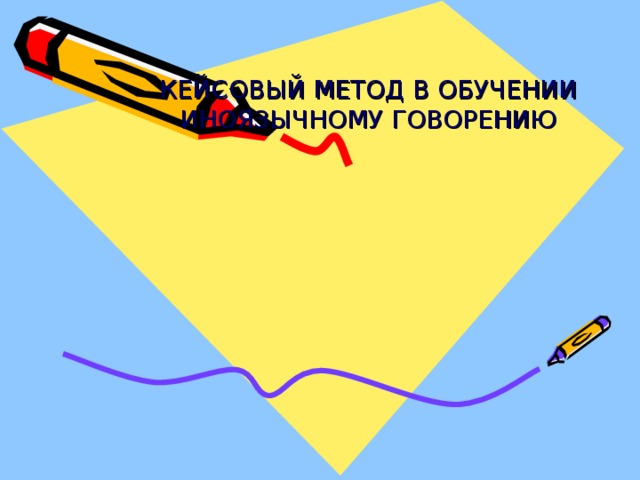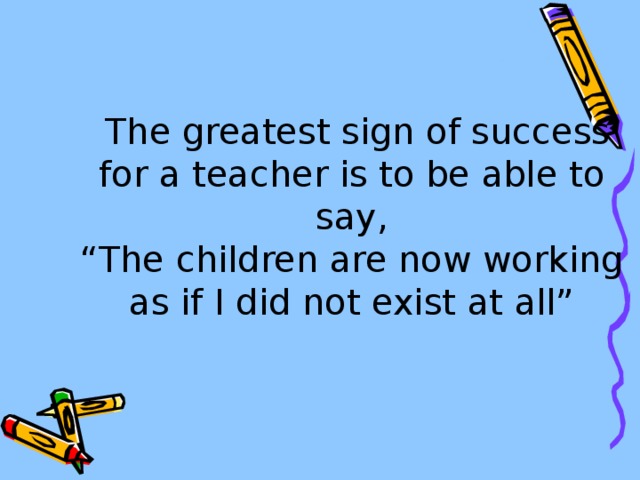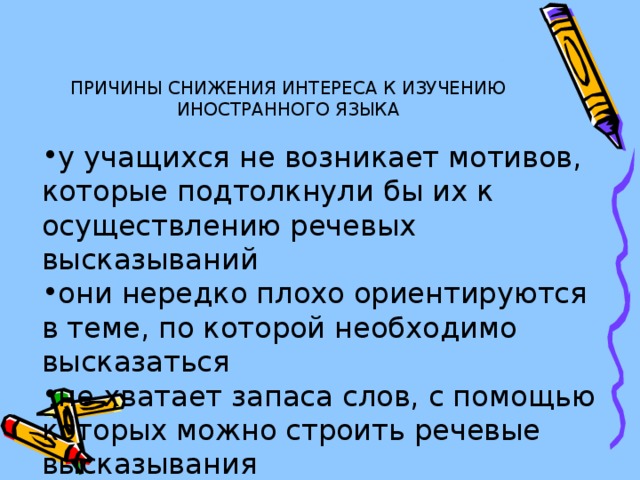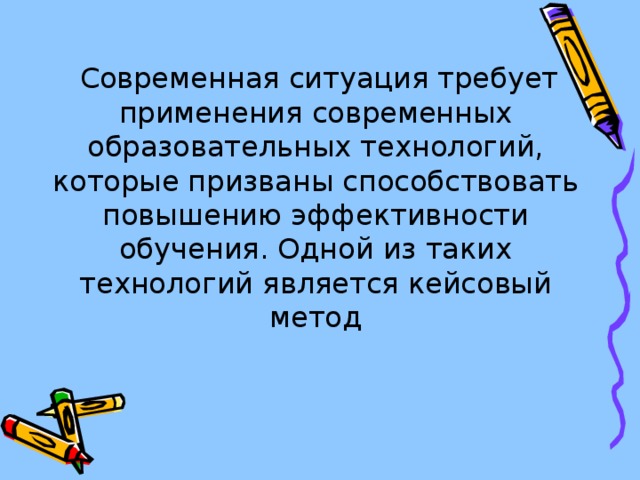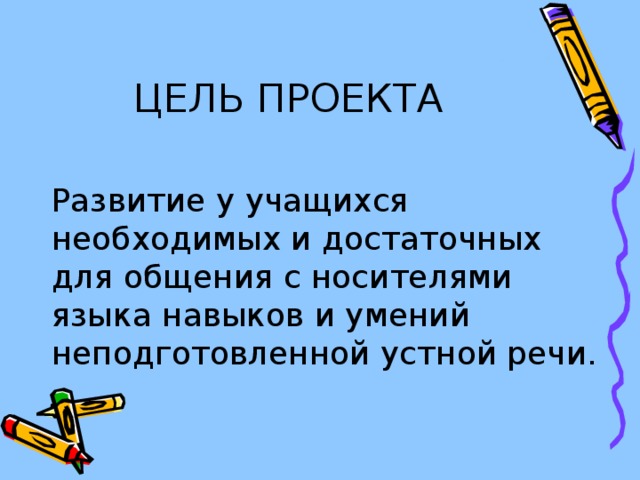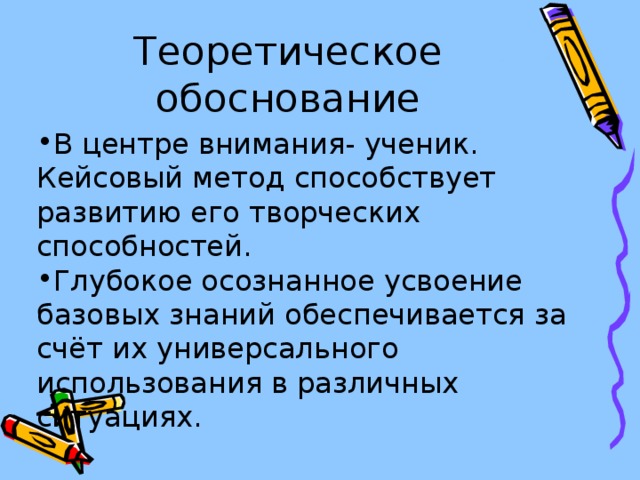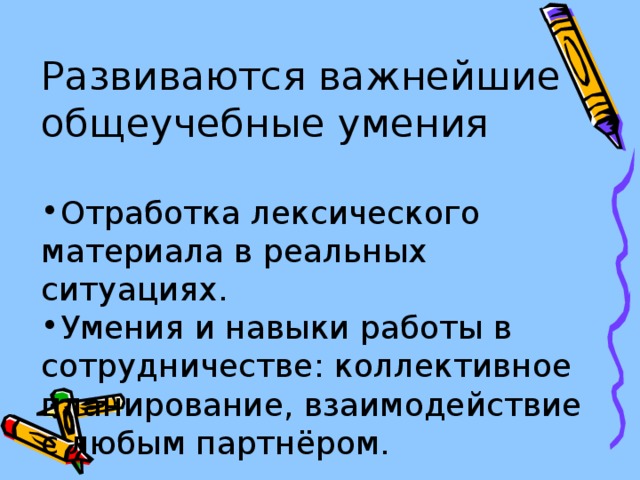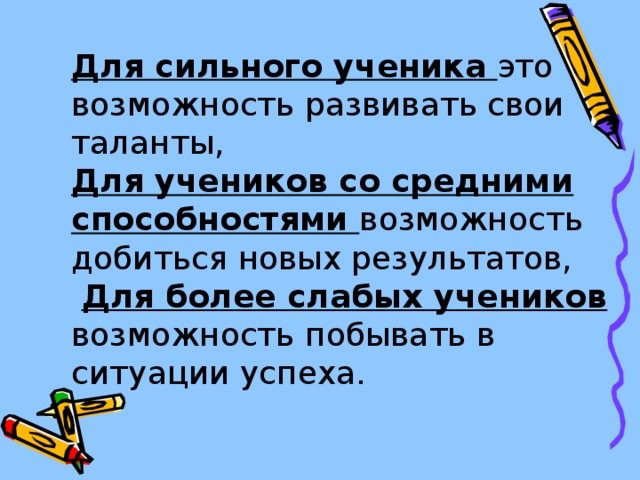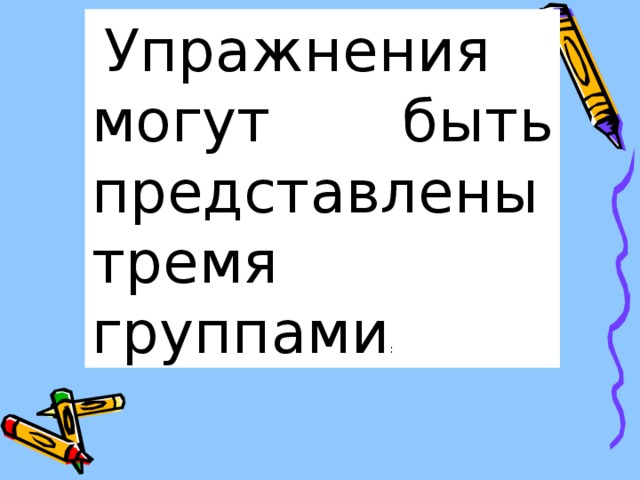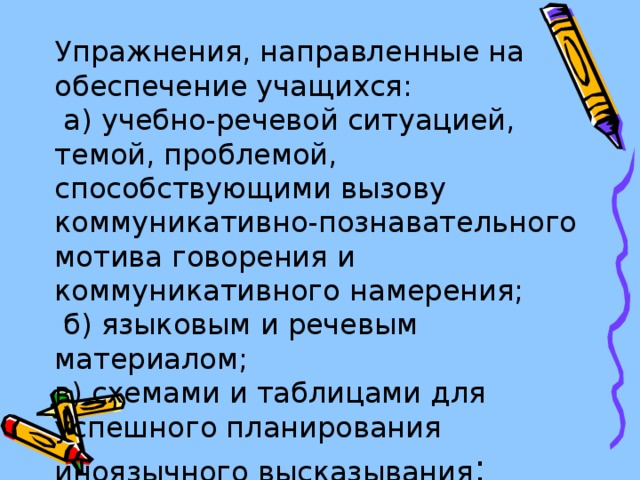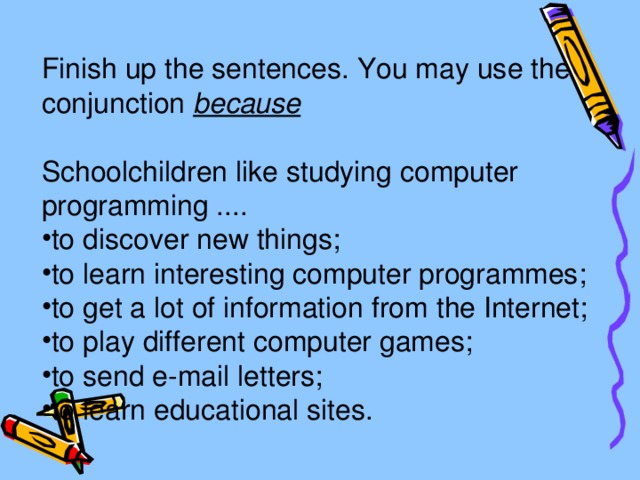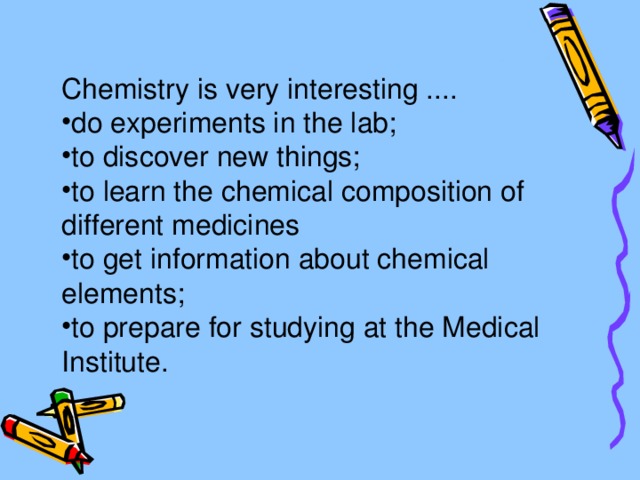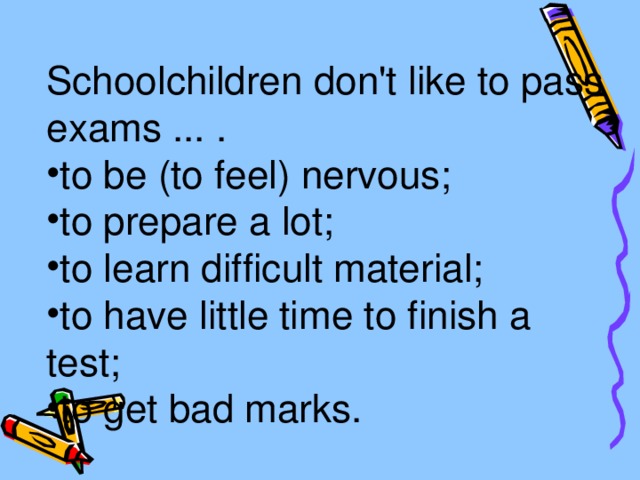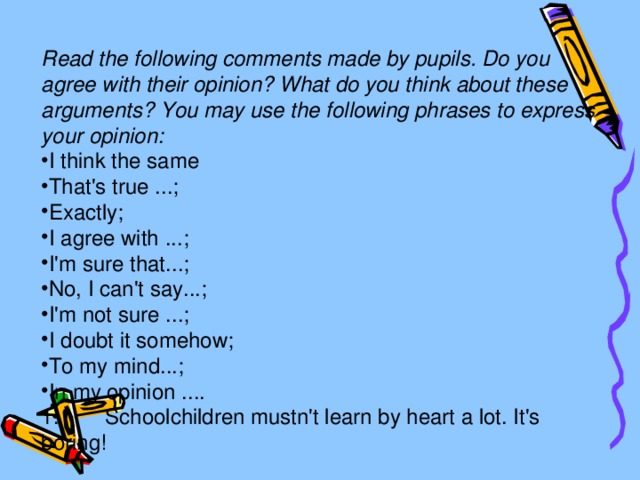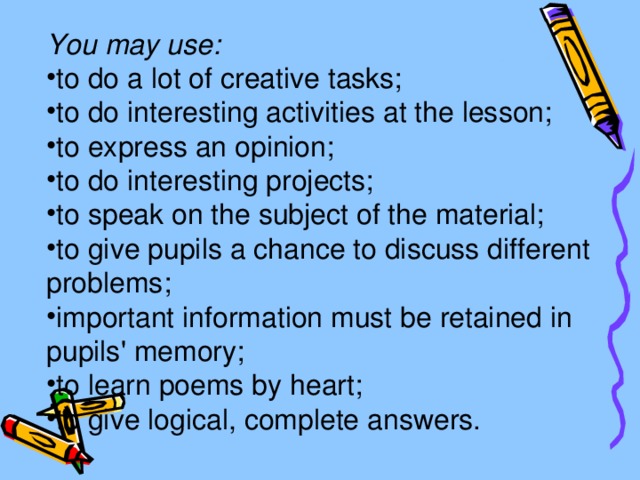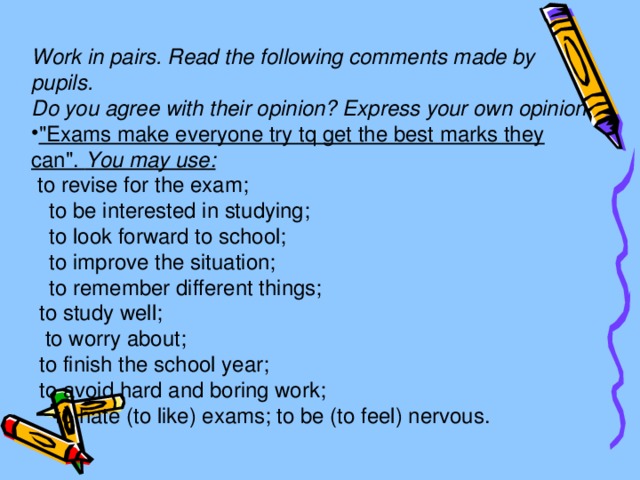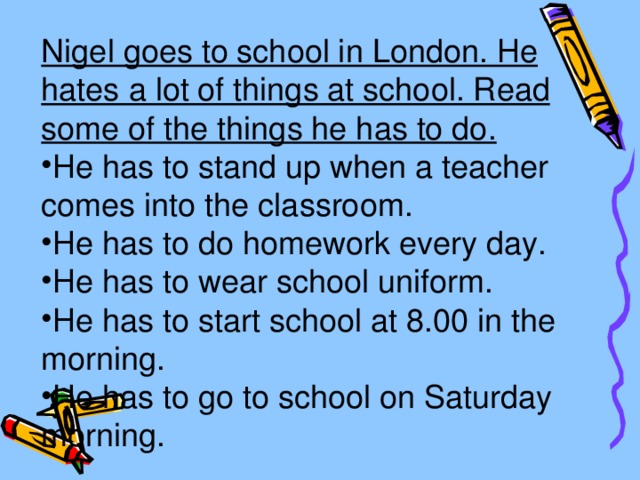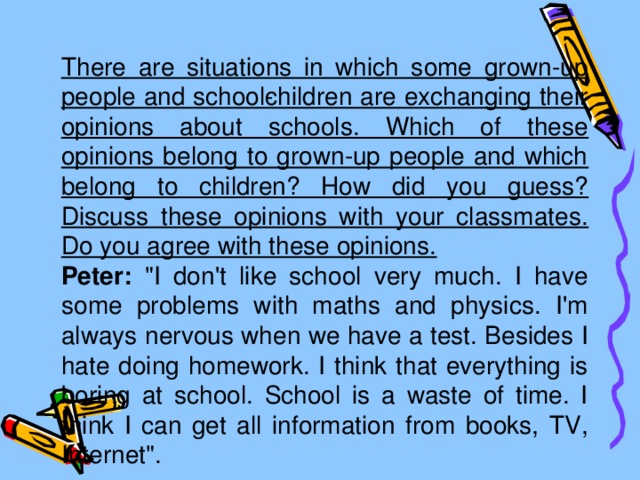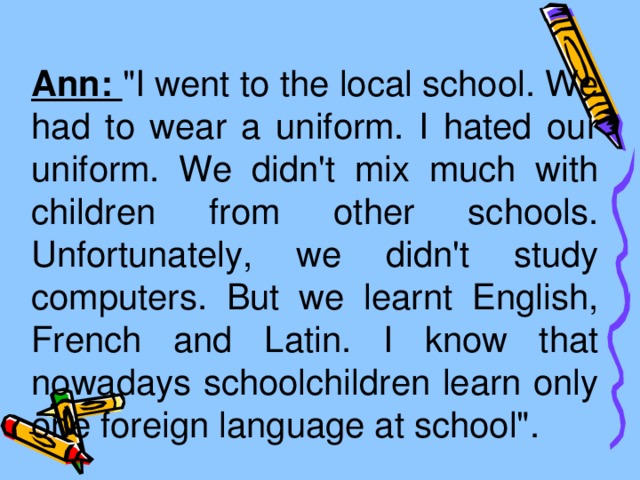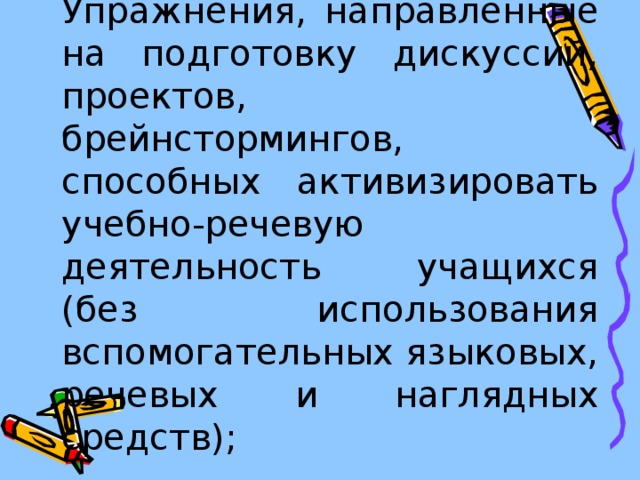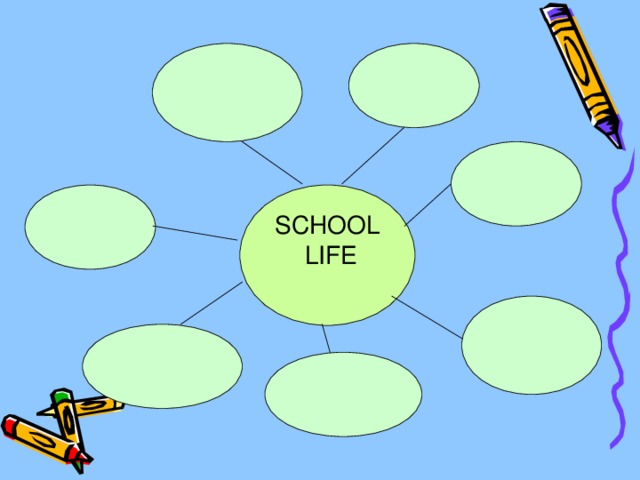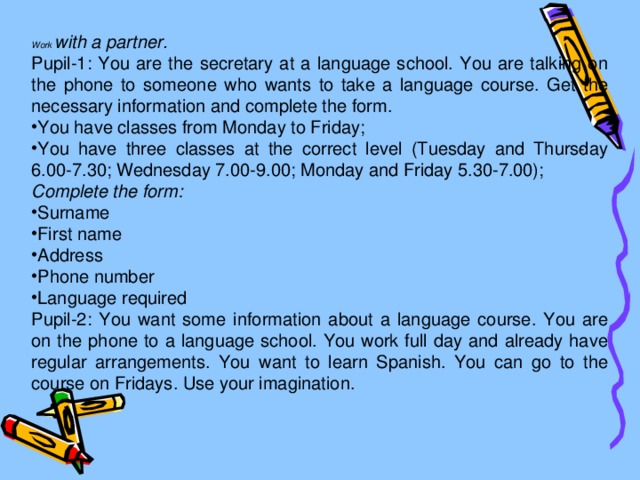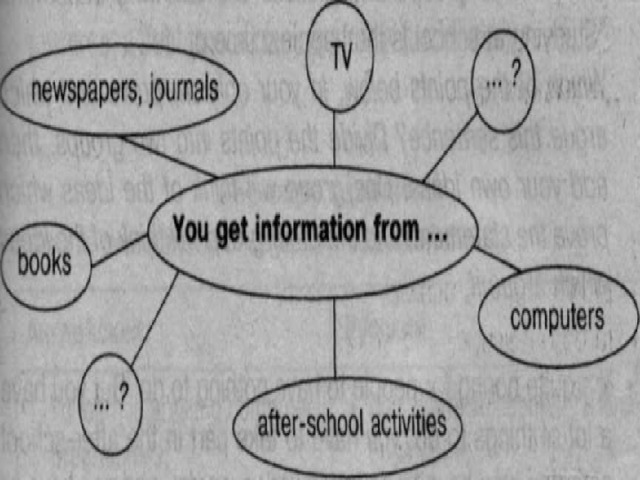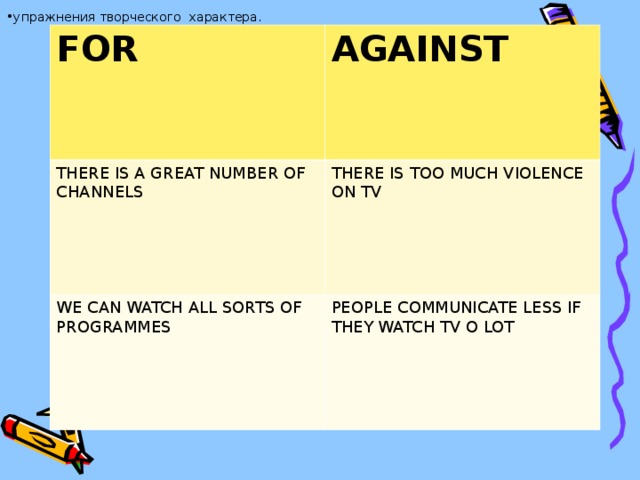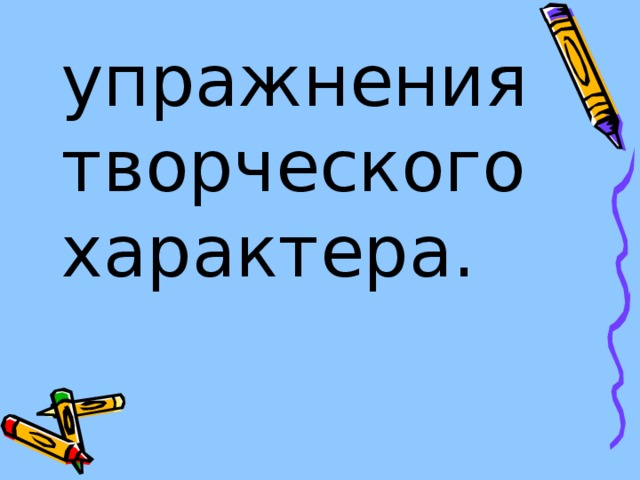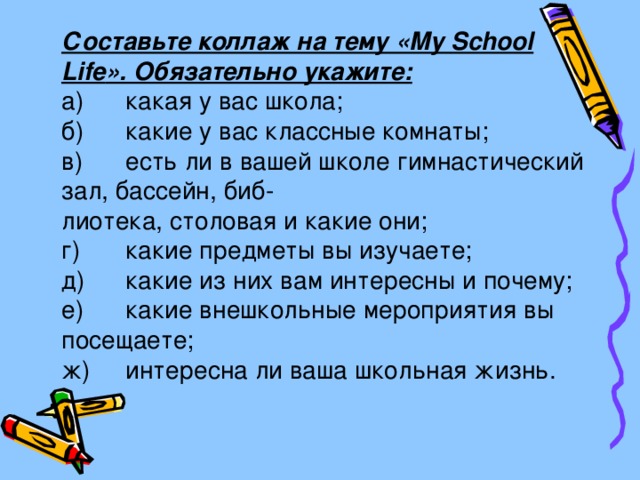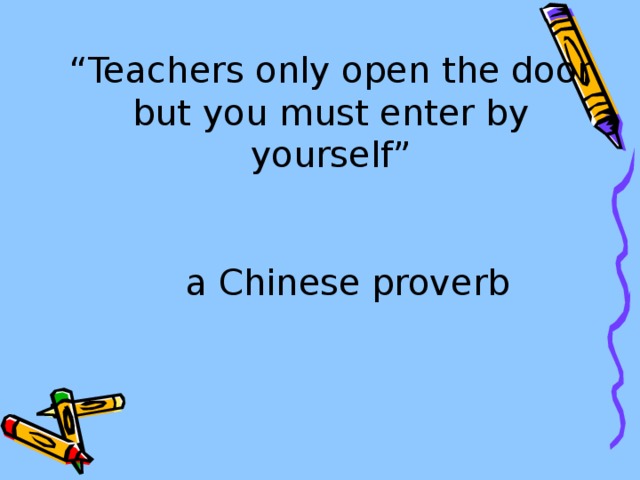Приложение . Упражнения по теме «Школа»
1 группа упражнений
Finish up the sentences. You may use the conjunction because
Schoolchildren like studying computer programming ....
to discover new things;
to learn interesting computer programmes;
to get a lot of information from the Internet;
to play different computer games;
to send e-mail letters;
to learn educational sites.
Chemistry is very interesting ....
do experiments in the lab;
to discover new things;
to learn the chemical composition of different medicines
to get information about chemical elements;
to prepare for studying at the Medical Institute.
Schoolchildren have to pass exams ....
to get the best marks;
the quickest way of testing pupils;
to revise different material;
to prepare for studying at the university;
to check up mistakes.
Schoolchildren don't like to pass exams ... .
5. Schoolchildren like learning English ... .
to be interested in culture of English people;
to read books written by English writers in the original;
to learn English songs and poems;
to learn to write e-mail letters;
to improve English;
to talk to a foreign friend.
Упражнение 2.
Read the following comments made by pupils. Do you agree with their opinion? What do you think about these arguments? You may use the following phrases to express your opinion:
I think the same
That's true ...;
Exactly;
I agree with ...;
I'm sure that...;
No, I can't say...;
I'm not sure ...;
I doubt it somehow;
To my mind...;
In my opinion ....
1. Schoolchildren mustn't learn by heart a lot. It's boring!
You may use:
to do a lot of creative tasks;
to do interesting activities at the lesson;
to express an opinion;
to do interesting projects;
to speak on the subject of the material;
to give pupils a chance to discuss different problems;
important information must be retained in pupils' memory;
to learn poems by heart;
to give logical, complete answers.
2. Schoolchildren should be allowed to have classes according to
their interests.
You may use:
to look forward to school;
to be interested in studying difficult material;
to talk to a deskmate;
to be ready for classes every day;
to learn difficult material better;
to prepare for studying at the university;
to become a specialist.
3. If you read many books, you'll study better.
You may use:
to investigate the world around us;
to get important information;
to discover new things;
to read creative works of famous writers;
to become a specialist;
to spend time;
to get information from TV, Internet;
to ruin eye-sight.
4. Pupils in schools must wear a uniform.
You may use:
to concentrate on the subject;
to discipline schoolchildren;
to follow the fashion;
to wear comfortable clothes;
to stick to the rule;
to be like other children.
5. Physical Education is very important subject.
You may use:
Упражнение 3.
Work in pairs. Read the following comments made by pupils.
Do you agree with their opinion? Express your own opinion.
"Exams make everyone try tq get the best marks they can". You may use:
to revise for the exam;
to look forward to school;
to improve the situation;
to remember different things;
to study well;
to worry about;
to finish the school year;
to avoid hard and boring work;
to hate (to like) exams; to be (to feel) nervous.
. "I feel nervous on the day of the exam, so I can't remember a
thing". ou may use:
to keep one's head;
to worry about;
important information must be retained in pupil's memory;
to give a logical, complete answer;
to be difficult;
to revise for the exam;
to finish the school year;
to hurry to finish the task;
to get good marks;
to be afraid of.
"The boy sitting next to me hadn't studied at all, but he copied my answers and passed the exam". iu may use: to check up mistakes; to be ready for; to be (to feel) nervous; to waste time; to feel uneasy;
to avoid hard and boring work;
to improve knowledge;
to pass (school-leaving, entrance) exams well;
to prepare for the lessons;
to be interested in studying;
to look forward to school;
to improve the situation;
to remember different things;
to study well;
to worry about;
to finish the school year;
to avoid hard and boring work;
to hate (to like) exams;
to be (to feel) nervous.
2. "I feel nervous on the day of the exam, so I can't remember a
thing".
You may use:
to keep one's head;
to worry about;
important information must be retained in pupil's memory;
to give a logical, complete answer;
to be difficult;
to revise for the exam;
to finish the school year;
to hurry to finish the task;
to get good marks;
to be afraid of.
3. "The boy sitting next to me hadn't studied at all, but he copied
my answers and passed the exam".
You may use:
4. "I write very slowly, so I hardly ever have enough time to finish
an exam". You may use:
Упражнение 4.
Nigel goes to school in London. He hates a lot of things at school. Read some of the things he has to do.
He has to stand up when a teacher comes into the classroom.
He has to do homework every day.
He has to wear school uniform.
He has to start school at 8.00 in the morning.
He has to go to school on Saturday morning.
Do you have to do any of these things in your school? Tell about some other things which you have to do in your school. What do you think about them? You may use the following phrases:
• There are some rules ...;
There should (not) be rules at ...;
All the rules are effective
Pupils should (not) ...;
Besides ...;
More than that...;
On the one hand
On the other hand ...;
To ... is a useful (important, strange, silly, wise) rule ;
to wear school uniform on all school occasions;
to greet the teacher by shouting a friendly "Good morning";
to pass exams at the end of the school year;
to talk to a deskmate;
to be ready for classes every day;
to be friendly to classmates;
to be late for the lessons;
to come to school on time;
to cooperate with other schoolchildren;
to study six days a week;
to address a teacher by surname;
to bring different things to school.
Упражнение 5.
A Read the following rules and choose the rules which, in your opinion, may be written by children (by teachers):
to wear a school uniform;
to move about the corridors in an orderly manner;
to play games during the breaks between the lessons;
to keep good discipline;
to be ready for classes everyday;
to address a teacher by surname;
to be polite always;
to do the best;
to respect people around you;
to have classes according to the interests.
В Tell you classmates about different things related to your school. The following questions will help you.
What do you think about some of the subjects such as computer programming, physical education, chemistry?
What is your favourite subject at school?
What is your favourite day at school? Why?
Are the pupils allowed to have classes according to their interests?
What do you think about examinations you have to pass at school?
Is it easy for you to pass an exam?
What do you think of this rule: "All pupils should wear a school uniform"?
Are there any rules at your school that you don't agree with?
You may use the following words and phrases:
• School subjects may be ...
useful;
interesting;
difficult;
boring;
• School subjects can help children ...
to get information;
to develop thinking;
to discover new things;
to prepare for studying at the university;
to do interesting projects;
to take part in interesting activities at the lesson;
to become a broad-minded person;
to improve knowledge;
to cooperate with other children;
to have lots of interesting activities;
• Examinations can help ...
to improve knowledge;
to remember different things;
to make everyone try to get the best marks;
to be interested in studying;
to keep one's head;
to check up knowledge;
to develop thinking;
to work hard;
• to get some practice at;
• Rules for children at schools can be ...
useful;
important;
strange;
silly;
fair;
wise;
• Rules for children help ...
Упражнение 7.
There are situations in which some grown-up people and schoolchildren are exchanging their opinions about schools. Which of these opinions belong to grown-up people and which belong to children? How did you guess? Discuss these opinions with your classmates. Do you agree with these opinions.
Peter: "I don't like school very much. I have some problems with maths and physics. I'm always nervous when we have a test. Besides I hate doing homework. I think that everything is boring at school. School is a waste of time. I think I can get all information from books, TV, Internet".
You may use the following phrases:
It's nice that ...;
I hope that ...;
I'm sure that ...; •*
I'm worried ...;
I'm nervous ...;
On the one hand ...;
On the other hand ...;
to review the material;
to improve knowledge;
to be interested in studying;
to look forward to school;
to check up knowledge;
to cope with the task;
to develop thinking;
to avoid hard and boring work;
to be useful;
to be nervous;
to hate (like) tests;
to be difficult;
hard work;
to get some practice;
to keep one's head;
to cooperate with other classmates; The following questions can help you:
Would you prefer to stay at home with your family than to go to school? Why?
Peter says that he has some problems with maths and physics. What about you? Do you think that maths and physics are difficult subjects?
Do you feel nervous when you pass exams?
Are you ready for classes everyday?
Do you like homework?
Do you agree with Peter that everything is boring at school?
Mike: "Our school is not the best, but I like it. It's big and new. I'm good at a lot of subjects. I've got some favourite subjects. They are maths, literature, physics. I should say that I like all subjects at school besides physical education. I think that modern life demands a lot of knowledge from young people. So we must train our brains but not our body". You may use the following phrases:
I like that...;
I can't do without...;
It's nice that...;
I hate that ...;
I wish ...;
to develop muscles;
to be good for health;
to do different physical exercises;
to spend time playing;
to play outdoor games;
to take part in interesting activities;
to develop thinking;
to allow minds to explore;
to investigate the world around;
to discover new things;
The following questions can help you:
Do you like your school?
Can you tell five things you like about your school?
What are your favourite subjects?
Why do you like them?
Do you agree with Mike that physical education is not useful for schoolchildren?
Ann: "I went to the local school. We had to wear a uniform. I hated our uniform. We didn't mix much with children from other schools. Unfortunately, we didn't study computers. But we learnt English, French and Latin. I know that nowadays schoolchildren learn only one foreign language at school".
You may use the following phrases:
I'm sure ...;
Besides ...;
I like that...;
I can't do without...;
2 группа упражнений
Work in groups of three and roleplay an interview between three schoolchildren.
Pupil-1 and pupil-2: You are British schoolchildren. You've come to Russia to meet Russian pupils. Find out your personal history from the chart. Give information about your school. Choose a name.
| Home town | Manchester | Leeds | Liverpool |
| Name of the school | Manchester School | Lawnswood School | Abbey Road School |
| Best subjects | maths, physics | chemistry, history | music, literature, drawing |
| Number of lessons a day | 5-6 lessons | 5-6 lessons | 5-6 lessons |
| Number of schooldays in a week | 5 days | 5 days | 6 days |
| Favourite holidays | Winter holidays | Summer holidays | Autumn holidays |
| After school activities | sport activities: swiming, self-defence | helping in hospitals | singing in the school choir |
| Hobbies | playing chess | collecting stamps | playing the piano |
| Future plans | studing at the technical university | studying medicine | becoming a singer |
Pupil-3: You are a Russian pupil. Interview your foreign friends. What questions would you ask to your British friends about their school life? Find out:
which city (town) your friends have come from;
how their schools are called;
if they have favourite subjects;
Упражнение 12.
Work with a partner.
Pupil-1: You are the secretary at a language school. You are talking on the phone to someone who wants to take a language course. Get the necessary information and complete the form.
Complete the form:
Surname
First name
Address
Phone number
Language required
Pupil-2: You want some information about a language course. You are on the phone to a language school. You work full day and already have regular arrangements. You want to learn Spanish. You can go to the course on Fridays. Use your imagination.
| Pupil-1: | Pupil-2: |
| Greet your partner. Tell your partner that he / she is talking with the secretary at a language school. |
| Greet your partner. Tell your partner that you want some information about a language course. |
|
|
|
| Ask your partner what language he / she would like to learn. |
| Answer the question. Ask your partner which days they have classes. |
Упражнение 3.
Work in two groups and discuss the following statement: "Studying at school is the happiest time of life". Which of the points below, in your opinion, prove and which argue this sentence? Divide the points into two groups, then add your own ideas. One group will think of the ideas which prove the statement, and the other group will think of the ideas which argue it.
It's quite boring for people to have nothing to do. But you have a lot of things to do: you have to take part in the after-school activities, you have to do homework everyday and you have to revise for the exams.
You don't have to work and to make money.
You study a lot of interesting subjects. Everyday you start learning new things.
You have to get up early every morning from Monday to Saturday. People say that it's very useful for health.
You make a lot of friends at school.
School helps you choose your future profession.
Упражнение 4.
Children, you all have different ideas about a school you'd like to go to.
The topic of the project is: "My Dream School".
Aim: to hold a discussion about pupil's Dream School.
Objectives:
Тестовое задание I
Какие вопросы можно задать, интервьюируя английского школьника?
a. How many lessons do you have every day?
b. How many times a week do you go to school?
c. What is your favourite subject?
d. What is your favourite film?
e. Do you have to wear a school uniform?
f. What after-school activity would you like to take part in?
Тестовое задание J
Составьте коллаж на тему «Му School Life». Обязательно укажите:
а) какая у вас школа;
б) какие у вас классные комнаты;
в) есть ли в вашей школе гимнастический зал, бассейн, биб-
лиотека, столовая и какие они;
г) какие предметы вы изучаете;
д) какие из них вам интересны и почему;
е) какие внешкольные мероприятия вы посещаете;
ж) интересна ли ваша школьная жизнь.
Выберите необходимые для составления коллажа слова и выражения:
useful; literature; to come in class on time; to read selected works; to wear a uniform; well-equipped; Secondary school; history; gymnasium; has a lot of books; maths; old; to keep good discipline; to do interesting projects; interesting; to help parents; wooden; Local school; computer programming; to be ready for classes; to go in for sports; boring; to be polite; small; to have tests; to wear a uniform; well-planned; to sing in the school choir; to do creative works; wise; English; to develop muscles; two-storeyed; difficult; Grammar school; to do the best; important; library; physical education; canteen; new; chemistry; favourite; swimming-pool.
